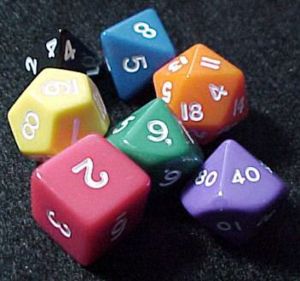Dice
 From Conservapedia
From Conservapedia Dice (singular "die") are usually cubical, and made of ivory or plastic (although other polyhedrons are in use). They used for gambling, roleplaying games, and other games of chance. Each face of the cube has a number of dots (called "pips) or a number on it. For a cubical die, the numbers are 1, 2, 3, 4, 5 or 6. Dice are used to generate random numbers by dropping or throwing the dice on a surface and seeing which sides come up. Other examples include a tetrahedral die (with 4 sides labeled 1 to 4) or a dodecahedral die (with sides labeled 1 to 20). Modern dice are made with precise machinery to make sure that the dice are not accidentally loaded.
Notation, General Use and other Properties[edit]
Dice can be used to generate not just single random numbers by random numbers in a given range with various rational weights to the effective outcome. For example, one can roll two cubical dice and take their sum. This is used in a variety of common games such as monopoly.
There exists a common shorthand for representing what dice should be rolled. In general, ndk denotes rolling n die of k sides and taking the sum. So for example, 3d4 would mean to roll three tetrahedral dice and take the sum that resulted. Other algebraic operations can also be done, so for example one could take 1d6 x 2 which would mean to roll a cubical die and take twice the number that appears. This notation also allows players to construct effective random number generators with result ranges other than those of the available dice, so for example 1d6 / 2 (rounded up) represents a d3. A d100 (percentile die) can be emulated by rolling (10 x 1d10) + 1d10, with a double zero being equal to 100 [1]. In general, if one has any die with k sides, the expected outcomes of ndk will approximate a bell curve as n gets large.
Crooked dice[edit]
In some cases, people have made dice which are not fair for various, often nefarious, purposes such as cheating in gambling. Method to do so include shaving off weight slightly from one side. Non-transparent die can also be loaded, with a weight added to one side, making that side more likely to land face down, and thus make the opposite side more likely to be the side that lands face up.
External links[edit]
Categories: [Games]
↧ Download as ZWI file | Last modified: 02/16/2023 19:55:53 | 31 views
☰ Source: https://www.conservapedia.com/Dice | License: CC BY-SA 3.0
 ZWI signed:
ZWI signed:
 KSF
KSF